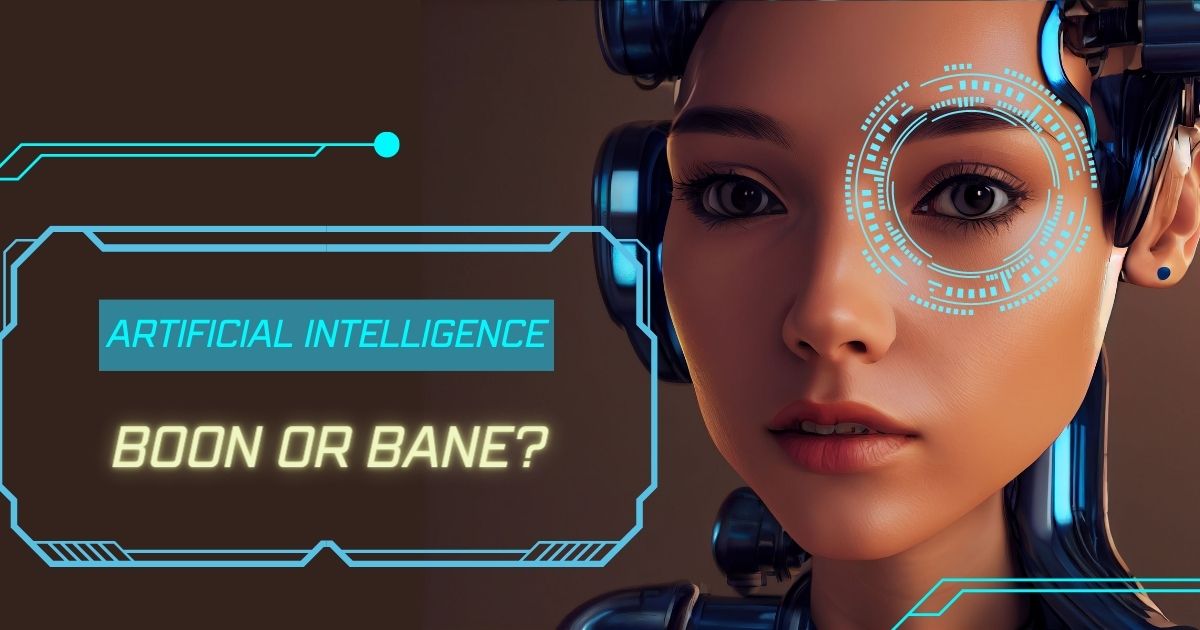
Artificial Intelligence: A Boon or Bane
Artificial Intelligence (AI) has emerged as one of the most transformative and controversial technologies of the 21st century. With its ability to process vast amounts of data, learn from experience, and perform complex tasks, AI has the potential to revolutionize various industries, improve efficiency, and enhance our daily lives. However, this unprecedented power also raises concerns about the ethical implications, job displacement, and the potential misuse of AI technology. As we navigate the intricate landscape of AI, it becomes imperative to weigh its benefits against the potential drawbacks, determining whether it is a boon or a bane for humanity.
On the positive side, AI has already demonstrated its capacity to bring about substantial positive changes in diverse fields. One of the most notable areas is healthcare, where AI is being used to analyze medical data, assist in diagnosis, and even predict patient outcomes. Machine learning algorithms can sift through vast datasets to identify patterns and trends that may be imperceptible to human doctors, leading to earlier and more accurate diagnoses. Additionally, AI-powered robotic surgeries have the potential to enhance precision and reduce recovery times, ultimately saving lives.
In the realm of education, AI is facilitating personalized learning experiences. Adaptive learning platforms leverage AI algorithms to tailor educational content to individual students’ needs, pacing, and learning styles. This not only enhances the effectiveness of education but also ensures that each student receives a customized approach to their learning journey. AI-driven educational tools can provide instant feedback, identify areas of weakness, and offer targeted resources for improvement.
The business world is also witnessing the transformative impact of AI. Companies are using AI-powered analytics to gain insights into consumer behavior, streamline operations, and make data-driven decisions. Chatbots and virtual assistants powered by natural language processing enable businesses to provide instant and efficient customer support. Moreover, AI is contributing to the development of innovative products and services, fostering a culture of continuous improvement and competitiveness.
Autonomous vehicles represent another significant breakthrough enabled by AI. The automotive industry is actively investing in AI technologies to develop self-driving cars, trucks, and drones. The potential benefits include reduced traffic accidents, increased efficiency in transportation, and improved accessibility for individuals with disabilities. As AI algorithms continue to evolve, the dream of a fully autonomous transportation system inches closer to reality.
In the field of environmental conservation, AI is playing a crucial role in monitoring and managing ecosystems. AI-powered sensors and drones can collect real-time data on deforestation, climate change, and wildlife populations. This information is invaluable for scientists and conservationists in making informed decisions and developing effective strategies to protect endangered species and preserve biodiversity.
However, the widespread adoption of AI is not without its challenges and ethical dilemmas. One of the primary concerns is the impact of AI on employment. As automation and machine learning technologies advance, certain jobs may become obsolete, leading to unemployment and economic displacement for certain sectors of the workforce. Striking a balance between the benefits of automation and the need for gainful employment is a complex challenge that society must grapple with in the coming years.
Privacy is also a significant issue associated with AI. As AI systems gather and analyze vast amounts of personal data, there is a heightened risk of unauthorized access and misuse. Striking a balance between the utility of AI applications and the protection of individual privacy is an ongoing challenge that policymakers and technologists must address through robust regulations and ethical guidelines.Furthermore, the potential for AI to be weaponized raises serious concerns about global security. The development of autonomous weapons systems, capable of making lethal decisions without human intervention, poses ethical dilemmas and the risk of unintended consequences. The international community faces the challenge of establishing norms and regulations to prevent the uncontrolled development and deployment of AI-powered weaponry.
Artificial Intelligence (AI) into the healthcare system has ignited a multifaceted debate, with proponents lauding its potential as a boon and skeptics expressing concerns about its bane-like implications. On the boon side, AI in healthcare has shown tremendous promise in enhancing diagnostic accuracy, enabling personalized treatment plans, and facilitating predictive analytics for preventive care. The ability of AI to process vast datasets allows for more nuanced insights into individual patient needs, leading to improved medical outcomes. Moreover, AI contributes to the efficiency of administrative processes, reducing the burden of paperwork and streamlining various tasks. However, the bane perspective emphasizes ethical concerns related to patient privacy, job displacement for healthcare professionals, and the potential bias in AI algorithms. The risk of overreliance on technology and the substantial costs associated with AI implementation also underscore the challenges. Striking a delicate balance between harnessing the benefits of AI for improved patient care and addressing the ethical and practical challenges is crucial for shaping the future of AI in the healthcare system.
The integration of Artificial Intelligence (AI) into forensic science has ushered in a new era of efficiency and accuracy in criminal investigations. One of the primary benefits is evident in image and video analysis, where AI algorithms can rapidly process and analyze vast amounts of visual data, aiding in tasks such as facial recognition and object detection. The accuracy of fingerprint analysis has significantly improved with the application of AI, ensuring more precise matches and reducing the margin of error. In DNA analysis, machine learning algorithms assist in the interpretation of complex profiles, facilitating quicker and more accurate identification of suspects. Digital forensics, a critical component in today’s technology-driven crimes, benefits immensely from AI’s ability to sift through large volumes of digital data, uncovering evidence in cybercrime investigations. Predictive policing, another notable application, leverages AI to analyze historical crime data, enabling law enforcement to allocate resources strategically and proactively address potential criminal activities. Moreover, AI aids in behavioral analysis and profiling, helping investigators identify patterns in criminal behavior and create more refined suspect profiles. The amalgamation of AI into forensic science not only expedites investigations but also enhances the overall effectiveness and precision of criminal analysis and identification processes.While Artificial Intelligence (AI) has brought about significant advancements in forensic science, it is essential to acknowledge its limitations. One notable constraint is the potential bias in AI algorithms, particularly when trained on datasets that reflect existing societal biases. This can introduce inaccuracies and unfairness in decision-making processes, especially in applications like facial recognition or predictive policing. Additionally, the interpretability of AI-generated results poses a challenge, as complex machine learning models may lack transparency, making it difficult to understand the reasoning behind their conclusions. In forensic DNA analysis, while AI can aid in interpretation, it is not immune to challenges such as sample contamination or the presence of mixtures, requiring careful human scrutiny. Moreover, the rapidly evolving nature of technology may outpace the regulatory frameworks, leading to ethical and legal uncertainties surrounding the use of AI in forensic investigations. Striking the right balance between the potential benefits and these inherent limitations is crucial to ensuring responsible and ethical integration of AI in forensic science.
Despite these challenges, the potential for AI to enhance human well-being remains significant. The key lies in responsible development, deployment, and governance of AI technologies. Ethical considerations must be at the forefront of AI research and application to ensure that the benefits are maximized while minimizing the risks and unintended consequences. It can be considered as supplement to human capabilities but can never be a replacement.
In conclusion, the impact of artificial intelligence on society is multifaceted, with both positive and negative implications. AI has the potential to be a powerful force for good, revolutionizing industries, improving efficiency, and solving complex problems. However, it also raises ethical concerns, from job displacement to biased decision-making and threats to privacy and security. As we navigate the evolving landscape of AI, it is crucial to prioritize ethical considerations, implement robust regulations, and foster a collaborative approach to ensure that AI continues to be a boon rather than a bane for humanity. Furthermore, AI interventions in domains like criminal justice system, healthcare management requires critical assessment and monitoring before coming in implementation.

Mr. Sahil Sharma
Mr. Sahil Sharma
Assistant Professor, Forensic Science Department, Geeta University Panipat.
Related Posts

Optimizing Health and Wellness:The Crucial Role of a Balanced Diet and Tailoring Nutrition to Individual Needs
Optimizing Health and Wellness: The Crucial Role of a Balanced Diet and Tailoring Nutrition to Individual Needs A balanced diet refers to a meal plan

Impact of Technology on Higher Education – Geeta University
Impact of Technology on Higher Education – Geeta University Technology has brought significant changes to all aspects of modern life, including the education sector. In

Bridging the Gap: The Power of Internships – Geeta University
Bridging the Gap: The Power of Internships – Geeta University In today’s competitive job market, a university degree alone may not be enough to secure


